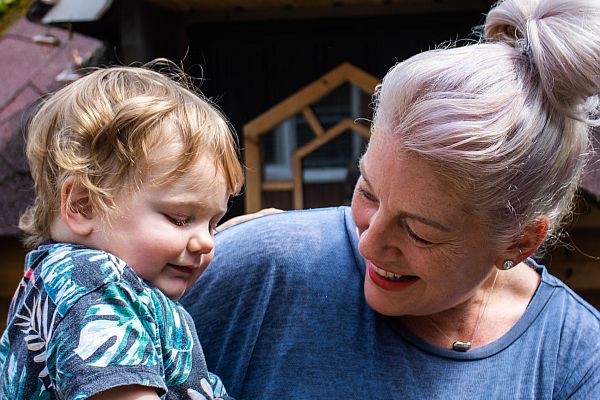Our annual Mindometer report is an in-depth look at what therapists are currently experiencing in their practice and reflects the mental health and wellbeing of the nation. Surveying 2,983 of our members, this year’s report saw a sharp decline of the public’s mental health in comparison to last year.
While the UK emerges from the COVID-19 pandemic, a range of social, economic and global issues are having a compounded negative impact on the population’s wellbeing, resulting in therapists reporting on demand for therapy being over capacity.
This highlights a need for increased investment to employ more therapists to help improve choice and access to therapy in a range of settings, such as the NHS, schools, third sector and workplaces. Everyone should be able to access a registered and qualified therapist should they need this support.
The state of the nation

The expert view on mental health
- Mental health is in decline - 75% of therapists say that the public’s mental health has declined compared to last year
- 88% of therapists who said mental health had declined in the past year list cost of living concerns as a reason for this
- 70% of therapists agree that there has been a rise in referrals from first timers to therapy over the past two years
- 50% of therapists say the demand for therapy is over capacity, this is up 11% compared to last year
- 57% of therapists report an increase in clients presenting with relationship issues in the past year
Cost of living

The cost of living is already having a negative impact on people’s mental health
- 61% of therapists say the rise in cost of living is leading people to report that they're anxious about whether they can afford to pay their bills
- 60% of therapists agree that clients are cutting back on therapy sessions due to money worries
- 54% of therapists have seen an increase in clients presenting with cost-of-living concerns over the past year
- 52% of therapists report clients are losing sleep due to cost-of-living concerns
- 49% of therapists report clients having to cut back on activities which help their mental health because of the rise in cost of living
- 47% of therapists report clients are cancelling or pausing sessions because they can no longer afford them
Socio-economic factors affecting mental health

The recent socio-economic issues create new anxieties
Eco-anxiety
- 24% of therapists report an increase in clients presenting with eco-anxiety or anxieties over climate change in the past year
- 19% of therapists report that the news and media is leading to increases in clients presenting with eco-anxiety and anxieties over climate change
Political anxiety
- 28% of therapists report an increase in clients presenting with political anxiety or anxieties around current affairs in the past year
- 22% of therapists report that the news and media is leading to increases in clients presenting with political anxiety or anxieties around current affairs
What our members say

People are facing new changes and more uncertainty. They feel powerless to be able to influence these issues and vulnerable to the consequences of these changes. There are therapists across the country who are there to help people explore and understand how they are feeling and to support them to find ways to cope with what they’re going through.

2022 has been a challenging time for many and with winter just around the corner, people are fearful of what’s to come. While it's easy to look at bills and the rising cost of living from a practical standpoint, try not to overlook the impact it may be having on your mental health as well. Asking for help is not a weakness, it's a strength because you're taking back control.

Socio-economic issues can have a profound impact on people's mental health. Eco-anxiety in particular has been an area of discussion. The high temperatures we experienced this summer opened our eyes to the very real impact of climate change. Speaking to a trained professional therapist can help manage your emotions if you are feeling overwhelmed by these issues.
Increases in many presenting issues

The overall mental health decline is seen through increases in clients presenting with anxiety, depression, stress, burnout and relationship issues
- 76% of therapists report increases in clients presenting with general anxiety in the past year
- 70% of therapists report increases in clients presenting with depression or low mood in the past year
- 67% of therapists have seen increases in clients presenting with stress in the past year
- 58% of therapists have seen increases in clients presenting with social anxiety in the past year
- 57% of therapists report an increase in clients presenting with relationship issues in the past year
- 50% of therapists report seeing an increase in clients presenting with burnout in the past year
Children and parenting

Parenting issues are on the rise as parents worry about their children’s mental health
- 35% of therapists have seen increases in clients presenting with parenting issues in the past year
- 72% of therapists report that clients with children have been more concerned about their children’s mental health over the past year. Of these, therapists reported the following reasons for this:
- social anxiety (59%)
- exam stress (59%)
- isolation because of COVID-19 (57%)
- family stress (56%)
- spending too much time on social media (50%)
The impact of COVID-19 2.5 years on

While the UK emerges from the pandemic, the impact of COVID-19 is still felt across the nation
- 56% of therapists have seen increases in clients presenting with feelings of isolation because of COVID-19
- 78% of therapists who reported having clients with re-entry anxiety around COVID-19 listed social anxiety as having worsened as a result
- 57% of therapists report an increase in clients presenting with re-entry anxiety as we emerge from pandemic restrictions
- 54% of therapists report an increase in clients presenting with health anxiety over the past year
What our members say

Sadly, these statistics are not surprising. The impact of coronavirus and its aftermath has had an enormous impact on the public's mental health. Reaching out for support can be a tough initial step, but please don't be put off seeking professional help if you're struggling with your mental health.

My initial reaction is sadness for children’s suffering as a result of a multitude of complex daily-life pressures. It prompts me to question what can we do (as adults and therapists) to influence relationships that encourage children to regain their natural curiosity, confidence, connectedness and belonging. Anxiety and isolation are crippling and need our primary attention.

The pandemic forced a lot of people to re-evaluate their lives and, in some cases, highlighted suppressed feelings of loneliness, and a focus on exactly who we have or, sadly, who we may not have had around us. Therapy can offer useful tools and techniques to manage these feelings before they feed into something bigger.
All figures are from a survey of our members. Total sample size was 2,983 therapists. Fieldwork was carried out between 2 July and 3 August 2022.
Previous Mindometer reports

Cost of living crisis: Survey shows impact on mental health
Two thirds of our members list cost of living concerns as a reason for Britain's mental health decline, our survey reveals

BACP Mindometer report 2021
Insights from therapists into the effect of lockdown and future challenges to the UK general population’s mental health.

Our major new report examines the pandemic's impact on the nation's mental health
Almost 5,000 members contributed to our inaugural Mindometer survey
Find out more

What therapy can help with
An A-Z list of issues and concerns which may be helped by talking to a counsellor.

Therapist Directory
How to use our online therapist directory to search for a counsellor or psychotherapist by location, services or specialisms

Types of therapy
An A-Z list of the different approaches, modalities or ways of working within counselling and psychotherapy.
